INTERVIEW: FIRE & DUST MEETS LINETTE RABSATT
I’m falling – not because I’m injured
it’s because I jumped
the roof called me to it
and I responded with a hefty leap
it’s not that I couldn’t keep
my marbles but I lost them
a long time ago
and although it is said that I know
better and should exercise
more common sense
the smoke in the air is dense
thick with loathing and the mist
of broken dreams that far
outnumber the list
of losses just like the crosses
we bear in our distorted minds
that tell us that falling is the answer
and that cancer
is just an astrological sign
when in truth – the cancer that
invades our minds
was designed to tell us that falling
is the norm when we stand tall
despite our height
fallen – for the schemes and reams
of broken dreams that sail us
off the rooftop
___________________–‘fallen’
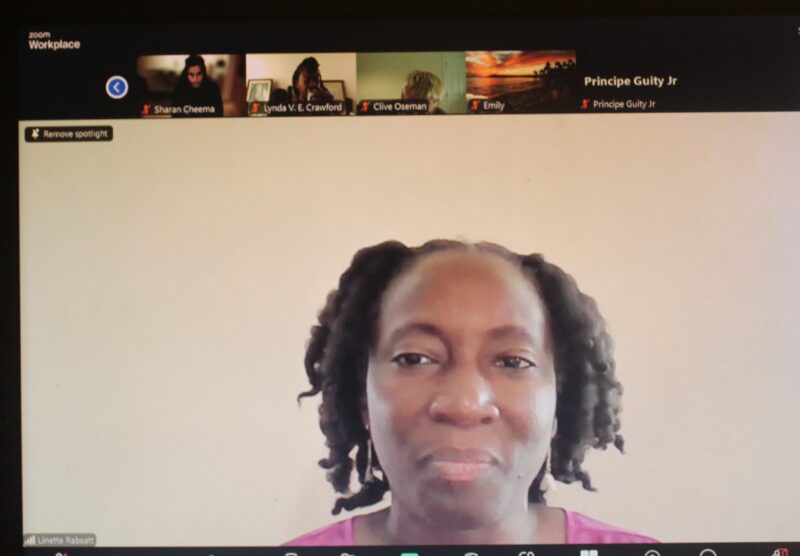
Linette Rabsatt is a Virgin Islands poet with roots in the BVI and USVI, who began writing in 1996. In 2024, she was nominated for a National Spoken Words Award for Best International Artist and also won the 2024 Read Yuh Ting TOO Virtual Caribbean Poetry Contest. You can find Linette’s work in her Kindle book Be Inspired: Poems by Linette Rabsatt, in Pulse Poetry Magazine, on her blog (Words of Ribbon), and on the Visual Verse and Micromance Magazine websites.
In March 2025, Linette was the guest headliner at our virtual Fire&Dust poetry night, where her set was well-received by the crowd. We caught up with her after the gig, to ask a few questions…
HCE: Tell us a little about your background and journey as a writer so far. What inspired you to start creating and performing poetry?
LR: I started creating poetry as a student in an English course at the University of the Virgin Islands. Dr. Vincent Cooper was my lecturer at the time and he encouraged me to continue writing. I attended poetry readings and was further encouraged to perform my pieces. I have shared a number of my poems on my blog, Words of Ribbon. I published Be Inspired: Poems by Linette Rabsatt in March 2023 as a Kindle Book. Since then, I have been performing at various online poetry readings including Fire&Dust, Calling All Poets Series, Cultivating Live Voices Poetry, Brownstone Poets, Let’s Po-et and many other events. Locally, I share my poems with local newspapers and participate in poetry competitions.
HCE: Who is your work aimed at – do you have an ideal audience in mind when you’re putting a poem together?
LR: My work is aimed at the general public. I try not to use profanity in my work and while I dabble in romantic poetry, I do not write overtly erotic poems. I have a few poems that are ideal for younger audiences including acrostic poems, pieces that required their participation (repetition of a word with a hand signal) and haikus. On World Poetry Day 2025, I visited three schools and shared poems with kindergarten, and First and Ninth Graders.
HCE: Members of the F&D audience were full of praise for your poems; a few suggested your work should be an educational resource in schools as it would “inspire the youth”. Did you encounter much poetry in the classroom when you were younger, and did you engage with the way it was taught?
LR: My preparation for the school visits for World Poetry Day 2025 could provide the basis for developing an educational tool for inspiring the youth. I think the acrostic poetry was well received because my words were simple and the children were able to read along. The participation poem was a technique I learned from Justin Hodge, another Virgin Islands poet. I have used that technique for both children and adult audiences to keep them engaged.
As a child, I loved nursery rhymes and fairytales. I lived with my grandmother and she’d have me recite poems for church activities. However, I never felt I was a good writer. I struggled through high school with literature until I enrolled in UVI. Almost 30 years later, I have written over 700 poems and have had several short stories, including drabbles and flash fiction, published.
HCE: Who or what would you say are the biggest influences on your own poetry?
LR: My poetry is heavily influenced by my family and community. I am inspired when I attend readings because I hear new voices, performance styles and fresh topics. I am also influenced by nature. I am a country girl at heart and living in the Caribbean allows me to enjoy the native flora and fauna, and write about them.
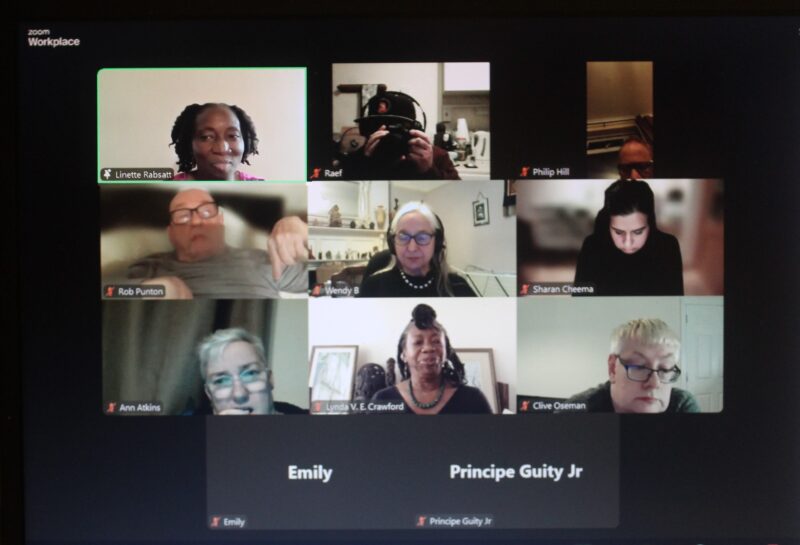
HCE: Would you say there are themes or motifs that you tend to gravitate to in your spoken word?
LR: I tend to write about social issues, loving oneself, using my inspiration to positively influence, music and nature. After Micromance Magazine accepted a love poem from my archives, I have started writing more romantic pieces.
HCE: Platforms like Zoom have enabled people from all around the world to gather together for poetry gigs and form supportive writing communities. But do you also attend plenty of events in person, and is there a thriving open mic culture across the Virgin Islands?
LR: Currently, the Virgin Islands hosts two major events that provide poets with the opportunity to share their work – LitFest and Creative Waves. The BVI National Commission for UNESCO hosts annual World Poetry Day Competitions for youth and adults. Poets in the United States Virgin Islands, the neighbouring islands, also host open mics and literary events.
HCE: What do you feel most well-written poems have in common?
LR: I think that well-written poems have language that draws the reader or listener to tune in closer. These poems may have tricky word play, exciting imagery, unique form and the right balance of literary techniques.
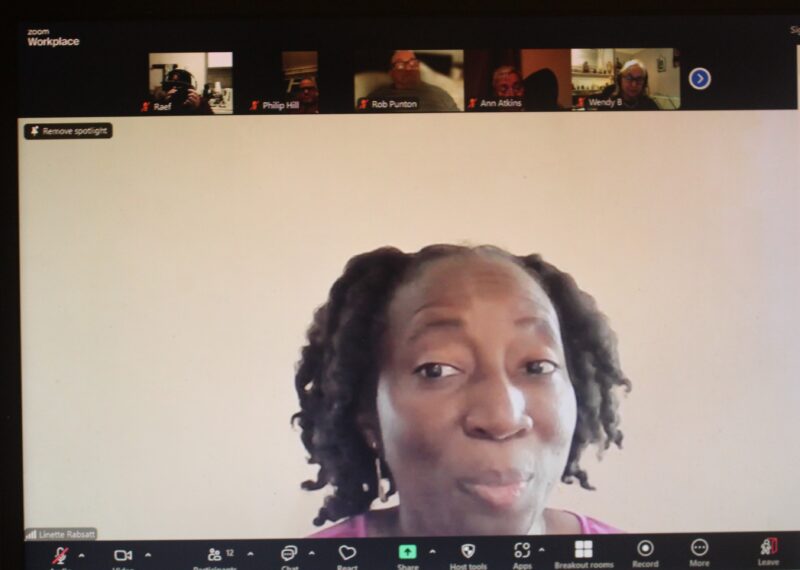
HCE: You mentioned during your Fire&Dust gig that you regularly take inspiration from prompts on social media poetry groups, which help you think differently and write outside the box. Can you talk us a little through your writing process when it involves prompts? (And perhaps recommend a few spaces other poets could visit for prompts?)
LR: I have been finding some unique prompts in Cultures of Art, Prose and Stories, Allie’s Ink Pen and Aspiring Writer’s Society. These groups offer word and ekphrastic prompts on topics or images that I would not normally consider.
When poetry.com was around in the 90s and early 2000s, they shared daily ekphrastic prompts for haikus. More recently, Visual Verse shared monthly ekphrastic prompts and a few of my poems were selected for this online publication.
I look at the photo and draw my interpretation from the subjects, colours or the first thought that comes to mind. A recent photo prompt depicted a white/greyed flower in front of a mirror with a yellow flower as the reflection. I wrote a haiku about ageing based on what resonated with me. A few of my poems created from the various prompts have been published in various journals and anthologies.
HCE: You also mentioned how a workshop run by Mark Fishbein played a role in producing your poem ‘Laws of Attachment’. Do you regularly attend writing workshops, and what impact have they had on your creative development?
LR: I don’t attend workshops very often because of the time difference. However, Mark and the other writers provide in-depth and relevant feedback to improve our poems. ‘Laws of Attachment’ was a poem that I had from my earlier collection and the feedback from Mark and the other poets helped me to rethink the poem so that it was more relatable – while not losing the original essence that I had developed. I think that my writing has improved since interacting with Mark and his team.
HCE: Your poetry often explores social challenges and activism, and achieves clear, strong messages without berating listeners. What is the top piece of advice you would give other poets who want to tackle political topics in their writing?
LR: Poets who want to tackle political topics must first ensure that they would not be in contravention of their employer’s policies. I am a Public Officer and I use my creativity to highlight the concerns of the community without being overtly negative or derogatory. Secondly, I suggest highlighting concerns one topic at a time – climate change, domestic violence, poverty, crime, etc. Consider recent events and remember that poets are the voice of the people. What are they saying? Use your creativity to relay the message from the people.
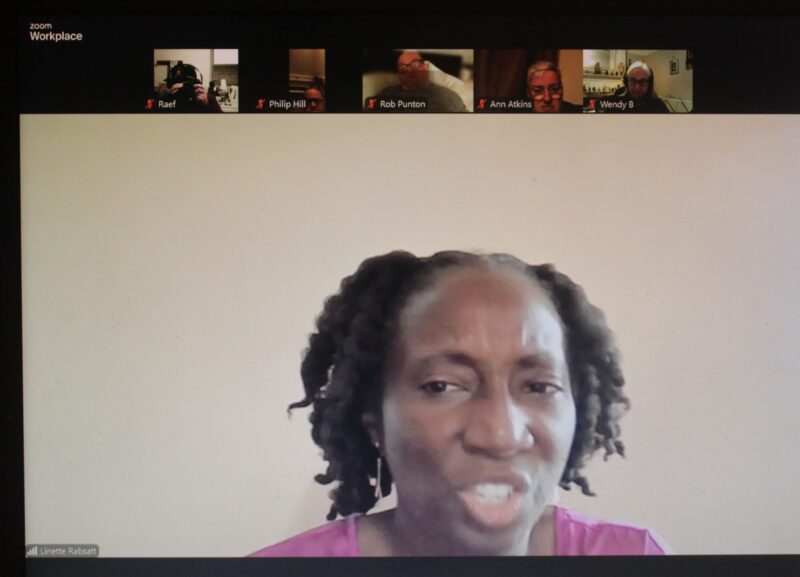
HCE: What, in your opinion, makes poetry and spoken word an effective device for sharing and spreading messages (both positive and serious)?
LR: Poetry is an effective tool to spread and share messages because the formal rules of essay writing do not apply. You can have fun crafting a long or short poem to call to action, spread awareness, or tell someone that you love them.
HCE: Many poets aspire to see their words featured on the page – in magazines, anthologies, their own collections. Do you have a routine or system when it comes to submitting your poems for publication? What are some useful or surprising things you’ve learnt so far about the world of publishing?
LR: I am not picky when choosing magazines or anthologies to submit my poems. I am more drawn to those that welcome free verse, and highlight nature, love, short form poetry, music and call to action. I have learned that no matter how well you may feel that you’ve written, editors reject your work. I resubmit the poem elsewhere and I submit new work to that publication for the next call. I have had poems that I didn’t have much confidence in get accepted to journals.
HCE: What type of poetry do you seek out for personal enjoyment? As a reader/listener, when you engage with a poet’s work, what are you hoping to get out of it?
LR: I enjoy reading other poets’ work in the various Facebook groups and listening to the plethora of voices at the online readings that I attend. I hope to be inspired when I listen. I’m looking for work that causes me to replay the event to cheer the poets!
HCE: In your opinion, what more could arts communities like Fire&Dust be doing to support writers from other nations, to make sure a diverse range of voices are platformed and heard?
LR: I think that Fire&Dust should continue hosting the readings and sharing the photos, write-ups and footage of the performances. I found Fire&Dust on Eventbrite but the time difference is my challenge to regularly attending. I would encourage the team to keep sharing the events on social media so that we can have new voices take the virtual stage.
HCE: You’re a compelling performer and we were impressed by how much you manage to smile while sharing your poems! Are you a cheerful person anyway, or do you consciously do this to help the audience feel more positive?
LR: I am a cheerful and optimistic person. I enjoy writing and sharing my poems. I feel it’s important to smile, especially when the poems speak of empowerment, love and our culture. I think the audience feels the positive energy even though we may be online.
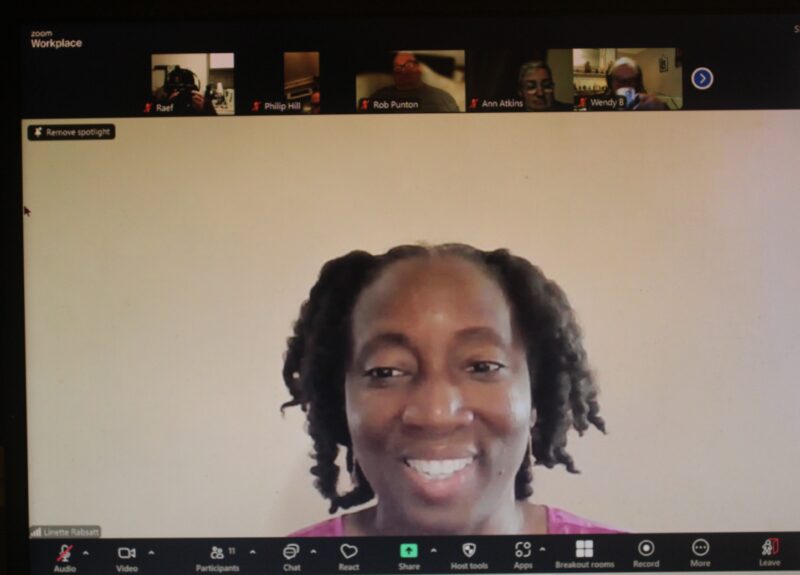
HCE: What’s next on the horizon for you?
LR: I am looking forward to having more of my work published in anthologies. Since my Fire&Dust feature, I have connected with Mario Franklin and Clarence Ferguson Jr. to record spoken word to instrumentals. This has been very exciting for me because I love performing.
Editor’s note: On Thursday 17th July, Linette will be headlining at a two-year anniversary show for Pass the Word VI (7-9PM, Cutlass & Cane in Yacht Haven Grand). The theme is ‘Belonging’.
HCE: What’s the best way for people to keep connected with you and your work, or contact you for bookings?
Blog Instagram Facebook Twitter/X Substack
HCE: Is there anything we didn’t cover that you’d like to share with our readers?
LR:
I would like to encourage writers with my mantra – Inspire the world with your words. In one of my pieces, I share, “words written and hidden are no use/ share them and let someone peruse.”
To everyone else, find your passion and always – Invest in what grows you.
